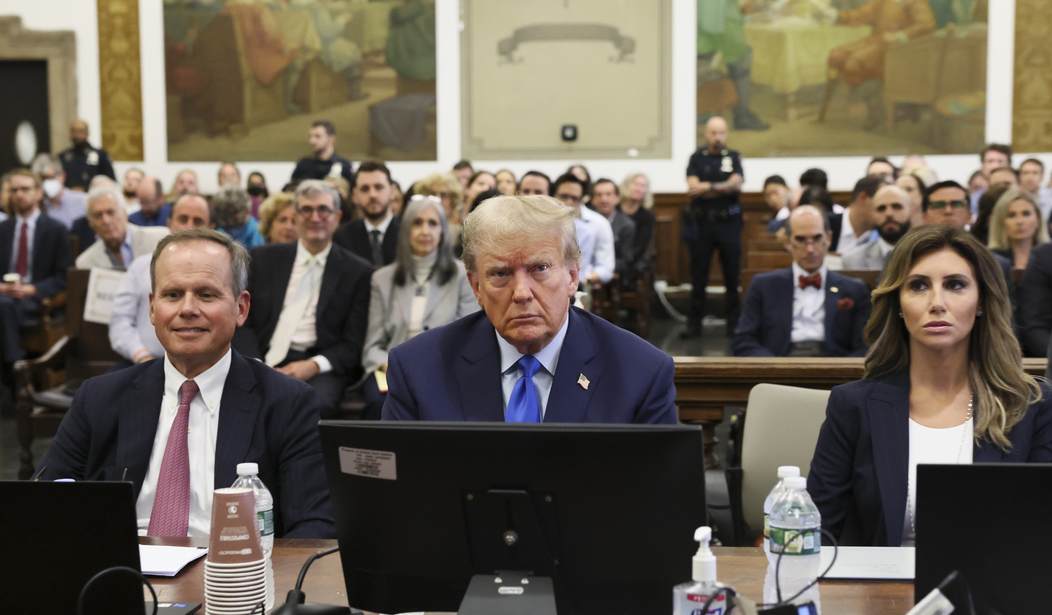On Wednesday, former President Donald Trump's legal team filed a mistrial motion for his New York fraud trial, claiming bias on the part of the judge and the primary law clerk. The motion calls out Judge Arthur Engoron specifically:
“This appearance of bias threatens both Defendants’ rights and the integrity of the judiciary as an institution,” Trump’s counsel wrote in the 30-page motion.
Trump’s counsel pointed to posts made by Judge Arthur Engoron to a Wheatley School alumni page, which the judge appears to run, referencing the case or individuals involved with it, including Trump, his son Eric Trump and Trump attorney Alina Habba.
The motion cited New York code reading that “a judge shall not make any public comment about a pending or impending proceeding in any court within the United States or its territories.”
The motion also calls out Judge Engoron's principal law clerk, who is apparently a partisan Democrat:
The former president’s legal team also addressed their concerns with Engoron’s principal law clerk, who has become an unwitting main character in the trial. They asserted the clerk has acted throughout the trial as a “co-judge,” conferring with Engoron via whispers or written notes before most orders have been issued.
“The principal law clerk is given unprecedented and inappropriate latitude,” Trump’s counsel wrote.
The filing also claimed the clerk has made “partisan political contributions in excess of strict limits,” including to groups that oppose Trump and support New York Attorney General Letitia James (D).
The trial has had a contentious run of events from the beginning. In September, Judge Engoron claimed that Trump was "massively overstating" the value of his properties. At that time my colleague Streiff reported:
In addition to the findings of fact, Engoron imposed a $7,500 fine on each of five members of Trump's legal team "to impress upon defendants’ attorneys the consequences of engaging in repetitive, frivolous motion practice after this court, affirmed by the appellate division, expressly warned them against doing so." He also revoked the business licenses of some of Trump's companies and ordered a receiver appointed to oversee the dissolution of those companies. Among those companies is Trump's flagship Trump Organization.
This move was later blocked by an appellate court. Following that ruling, the judge issued a ruling barring Trump from transferring any assets from his businesses. And later in October, Judge Engoron slapped a $10,000 fine on Trump for violating a gag order; the gag order was later overturned. Trump has responded with his usual vigor, accusing the judge of bias, even as the judge is on camera laughing during one of Trump's court appearances.
Congresswoman Elise Stefanik (R-NY) has also filed an official judicial complaint against Judge Engoron for his handling of the Trump case. And last week, Trump's attorney Alina Habba gave a "scorching" press conference in which she called Judge Engoron "unhinged."
Former Pres. Trump is currently in the middle of a primary campaign for the Republican presidential nomination and has won some significant legal victories involving the election itself, particularly in cases in Michigan and Minnesota where legal cases attempted to exclude Trump from the ballot on 14th Amendment grounds. Another case in Colorado is still ongoing.
While Trump is embroiled in several legal cases that potentially will last throughout the 2024 campaign season, just as a matter of record it's interesting to see what the United States Constitution has to say about the requirements one must meet to be elected as, and serve as, President of the United States. Article II, Section 1, under the Executive Branch, states only this:
No Person except a natural born Citizen, or a Citizen of the United States, at the time of the Adoption of this Constitution, shall be eligible to the Office of President; neither shall any Person be eligible to that Office who shall not have attained to the Age of thirty five Years, and been fourteen Years a Resident within the United States.
Note there is no disqualification for having been accused of or even convicted of a crime; while the effects on the voters may be, shall we say, adversely affected by a criminal conviction, as far as the Constitution is concerned, a candidate could be actually in a prison cell on Election Day and still be legally elected -- however unlikely that may be.
Trump, legal issues notwithstanding, is pushing ahead, already releasing agenda items should he be elected for a second term. And the usual suspects have already surfaced to call him (along with any other GOP candidate that might win the nomination) the usual names. In that respect, at least, the 2024 Presidential contest is proceeding as usual.














Join the conversation as a VIP Member